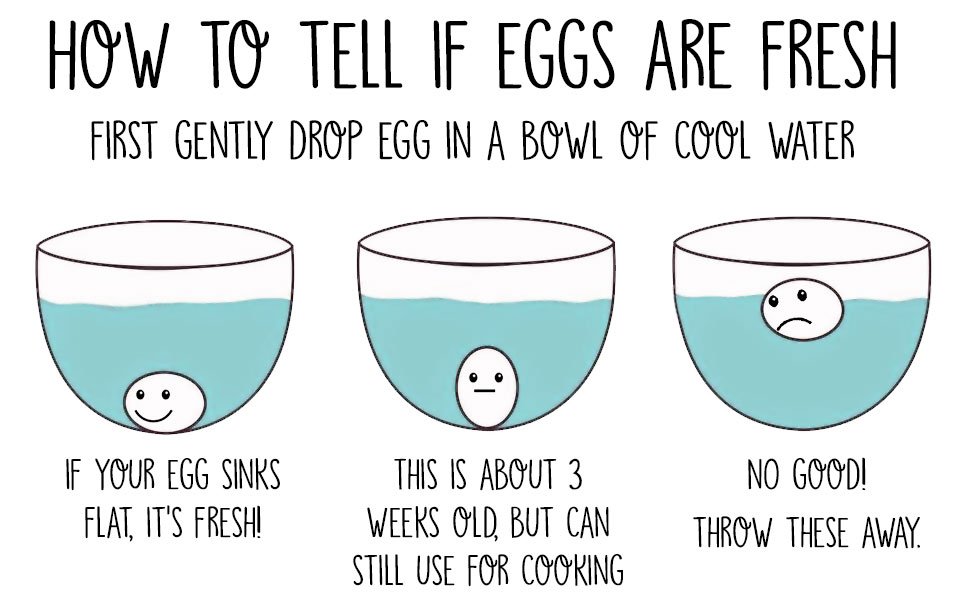Introduction:
Eggs are one of the most loved and widely consumed foods worldwide. They’re versatile, affordable, and packed with nutrients. You can scramble them for breakfast, bake them into cakes, or use them in salads and sandwiches. But here’s the tricky part—eggs don’t come with a flashing red light that says “I’m spoiled!”. So how do you know if that carton sitting in your fridge is still safe?
You can tell if eggs are bad by using simple checks like the float test (fresh eggs sink, bad ones float), sniff test (spoiled eggs smell sulfur-like or rotten), and visual inspection (cracks, sliminess, or discolored yolk/whites). When in doubt, always throw it out to stay safe.
Learning how to tell if eggs are bad is more than just a cooking hack—it’s a vital skill for keeping your meals safe and delicious. This guide will cover everything you need to know in detail, from classic freshness tests to scientific reasons behind egg spoilage. By the end, you’ll never second-guess your eggs again.
In This Article, we discuss “How to Tell If Eggs Are Bad.”
Why It’s Important to Check Egg Freshness:
Health Concerns of Eating Bad Eggs:
Eating a bad egg isn’t just unpleasant—it can make you seriously sick. Spoiled eggs may contain Salmonella, a bacterium that can cause food poisoning. Symptoms include:
- Nausea
- Vomiting
- Diarrhea
- Abdominal cramps
- Fever
These symptoms usually appear within 6 to 48 hours after eating a contaminated egg. While most healthy adults recover quickly, young children, elderly individuals, pregnant women, and people with weakened immune systems can face severe complications.
Food Waste and Money-Saving Benefits:
Throwing away eggs too early wastes money, but holding onto them for too long risks your health. By learning to test egg freshness properly, you’ll strike the perfect balance: reducing food waste while making sure every meal is safe. Think of it as giving your wallet and your stomach a win at the same time.
In the long run, these small habits add up—not only will you save money, but you’ll also contribute to cutting down unnecessary household food waste, which is good for both your budget and the environment.
How Long Do Eggs Last?
Fresh Eggs Shelf Life:
- Refrigerated store-bought eggs: 3–5 weeks past the purchase date.
- Unrefrigerated (farm-fresh, with bloom intact): 1–3 weeks at room temperature, depending on climate.
Hard-Boiled Eggs Shelf Life:
Once boiled, eggs lose their protective barrier and spoil faster:
- In shells: 1 week in the refrigerator.
- Peeled: 1–2 days if stored in an airtight container.
Farm-Fresh vs. Store-Bought Eggs:
- Farm-fresh eggs: Often unwashed, meaning they still have their natural protective coating (called the bloom), which helps prevent bacteria from entering.
- Store-bought eggs: Washed and sanitized for safety, but that process shortens their shelf life slightly.
Understanding Expiration Dates:
Sell-By vs. Use-By Dates:
- Sell-by date: Tells stores how long to display eggs.
- Use-by date: The manufacturer’s estimate of peak quality.
Eggs are often still edible weeks beyond these dates if properly stored.
Julian Date Code on Cartons:
Look closely at the carton, and you’ll see a 3-digit Julian code. This represents the day of the year the eggs were packed:
- 001 = January 1
- 365 = December 31
Example: Code “150” means the eggs were packed on May 30. If stored properly, they should be fine for several weeks after that date.
The Water Test: On How to Tell If Eggs Are Bad:

Step-by-Step Guide:
- Fill a bowl or glass with cold water.
- Place the egg gently into the water.
- Observe its behavior.
What Sinking, Tilting, or Floating Means:
- Sinks and lies flat → Very fresh.
- Sinks but stands upright → Still good but should be used soon.
- Floats → Old and likely spoiled.
Why It Works:
Eggshells are porous, allowing air to enter as eggs age. The older the egg, the larger the air pocket inside, making it buoyant enough to float.
Limitations of the Test:
A floating egg doesn’t always mean it’s rotten—sometimes it’s just old. Always combine this method with smell and visual inspection before making a decision.
The Sniff Test: Trust Your Nose:
This is the gold standard of egg freshness checks.
- Fresh eggs: Little to no odor.
- Bad eggs: Strong sulfur-like, sour, or rotten smell.
If you catch even a hint of something unpleasant, don’t risk it—discard the egg immediately.
The Shake Test: Listening for Freshness:
Hold an egg up to your ear and gently shake it.
- Fresh egg: Little to no sound.
- Old egg: Sloshing noise, indicating watery contents.
While not foolproof, it’s a handy trick if you don’t want to crack the egg just yet.
Visual Inspection Before Cracking:
- Shell quality: Should be clean, smooth, and intact.
- Red flags: Cracks, sliminess, or powdery residue (signs of mold or bacteria).
- Odd discoloration: Unusual spots or stains may indicate contamination.
Inspecting Eggs After Cracking:
Once you’ve cracked the egg into a bowl:
- Yolk: A fresh yolk is round, dome-shaped, and firm. A flat yolk indicates age.
- Egg white (albumen): Should be thick and slightly cloudy. Watery whites mean the egg is old.
- Blood spots: Not harmful, just a result of a ruptured vessel during egg formation.
Other Traditional Methods to Tell if Eggs Are Bad:

The Candle Test (Candling):
Farmers often hold an egg up to a bright light in a dark room. This lets them see the air pocket size, yolk position, and overall freshness.
Grandma’s Kitchen Tricks:
Some home cooks rely on touch and weight—heavier eggs tend to be fresher, while lighter eggs usually mean larger air pockets inside.
What Happens If You Eat a Bad Egg?
Mild Symptoms:
- Stomach cramps
- Nausea
- Mild diarrhea
Serious Risks:
If the egg is contaminated with Salmonella, symptoms may escalate to:
- High fever
- Severe diarrhea
- Vomiting
- Dehydration
When to Seek Help:
- If symptoms last more than 48 hours.
- If young children, elderly adults, or those with weak immune systems are affected.
How to Store Eggs Properly:
- Keep them in the carton: Protects from damage and odors.
- Avoid fridge door storage: Temperature fluctuates too much.
- Best spot: Middle or lower shelves where temps stay steady.
- Fridge temperature: Keep below 40°F (4°C).
How to Extend Egg Shelf Life:
- Freeze eggs: Crack, beat, and freeze in ice cube trays. Perfect for baking or scrambling later.
- Don’t wash farm-fresh eggs: Washing removes the protective bloom.
- Avoid odor transfer: Store away from onions, garlic, and fish.
- Keep shells intact: Cracked eggs should be used immediately.
Common Myths About Egg Freshness:
- Brown eggs are fresher than white eggs → False. Shell color only depends on the chicken breed.
- Organic eggs last longer → Not true. Freshness depends on storage, not farming method.
- Washing eggs makes them safer → Washing can shorten shelf life by removing protective coating.
Step-by-Step Egg Freshness Checklist:

- Look at the expiration or Julian date.
- Inspect the shell for cracks or slime.
- Perform the water test.
- Crack it open—check yolk and white.
- Smell it—trust your nose above all else.
Conclusion:
Eggs are a nutritious and versatile food, but freshness is crucial. With simple methods like the float test, sniff test, and shell inspection, anyone can check egg safety. Combined with proper storage, these steps prevent foodborne illness and reduce waste.
Always remember: when in doubt, throw it out. Your health matters more than saving a single egg.
Eggs may look simple, but keeping them fresh requires a little knowledge and care. By learning these tests—the water test, sniff test, shake test, and visual checks—you’ll always know how to tell if eggs are bad. Storing them properly extends their shelf life, saving you money and preventing waste. Next time you’re unsure about that carton in your fridge, follow this guide, and you’ll never second-guess your eggs again.
FAQs
1. How to tell if eggs are bad without cracking them?
The float test is the easiest and most reliable method. Place the egg in water—if it sinks, it’s fresh; if it floats, it’s bad and should be discarded immediately.
2. Can you still eat eggs after they’ve passed the expiration date?
Yes, as long as they pass freshness tests like the water test and smell check. Dates are guidelines, not absolute rules, so trust your senses before eating.
3. Is it safe to eat eggs with a cloudy white?
Yes, cloudiness often indicates extra freshness due to carbon dioxide still being present. It’s not a sign of spoilage and doesn’t affect taste or safety.
4. What happens if you accidentally eat a bad egg?
You might experience mild stomach issues or, in rare cases, food poisoning. Seek medical help if symptoms persist or become more severe over time.
5. Do eggs last longer in the fridge or at room temperature?
Refrigeration significantly extends freshness by slowing bacterial growth. At room temperature, eggs spoil much faster—within a week in warm climate,s especially.
6. How do you store cracked eggs safely?
Beat them lightly, transfer to a sealed container, and refrigerate right away. Use them within 2 days to ensure safety and prevent foodborne illness.
7. Can you freeze eggs to make them last longer?
Yes, you can freeze eggs safely. Crack them into a bowl, beat lightly, and store in freezer-safe containers for up to 1 year without quality loss.
8. Are brown eggs more long-lasting than white ones?
No, shell color doesn’t affect shelf life in any way. Freshness depends on storage conditions, not the egg’s color or the breed of the hen.
9. Is washing eggs before storing them a good idea?
Not usually. Washing removes the natural protective coating, making eggs more vulnerable to bacteria. Only wash just before use to keep them safe.
10. How can you tell if a hard-boiled egg has gone bad?
Smell is the best indicator for boiled eggs. If it gives off a strong, unpleasant odor, it’s spoiled. Also, avoid slimy or chalky shells for safety.
Read More:
What to Pack for Your Europe Trip: The Ultimate Europe Packing List
Virtual Meeting Etiquette: Essential Rules for Professional Online Communication
United Airlines Flight UA770 Emergency Diversion: A Complete Story
Curriculum Vitae vs Resume: Understanding the Key Differences and Choosing the Right One
